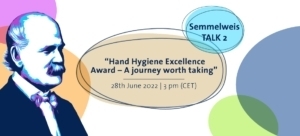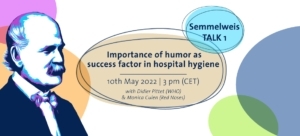Prof. Andreas Voss is convinced that communication is one of the most important factors in infection prevention. With him spoke Carola Timmel at the Congress ….
Mr. Voss, the infection rate in the Netherlands is low. What are the Dutch hospitals doing better than the most hospitals in other countries?
First of all, it has to be said that the figures for infections are not clearly lower than in Austria or Germany. We currently have five percent in the Netherlands. But the figures for Antibiotic consumption and for multiresistence are significantly lower.
The Netherlands are known for their prudent handling with antibiotics …
Yes, the culture to prescribe less antibiotics exists since more than 20 years. It is rare that our physicians prescribe antibiotics and if they prescribe, the decision is taken carefully. And in fact in many cases it is not necessary to prescribe them.
Also in the hospitals we take a close look whether an antibiotic is often used, how long and in which dose it is used, what is the interaction with other drugs etc…
Since the mid-1980-s we have strict protocols how to handle with resistant microorganisms.
That are some of the advantages of the Dutch System, which is of course cost-intensive, but which ensures that the patients get a better therapy.
The motto of this conference is communication. What can communication accomplish in the trias hygiene, surveillance & control?
I think that communication is one of the most important factors in infection prevention. Unfortunately many mistakes were made in the past – blaming and shaming are not the right approach to motivate healthcare workers to change their behaviour. It is important to simplify their work and to introduce intelligent solutions such as bedside disinfection of the hands.
The same also applies to hygienists – the introduction of measures to simplify processes and structures is very important for their daily live in the hospitals – for example reduction of protocols etc.
Better communication is also needed especially in the field of hand hygiene. How can communication help to increase compliance, and why is it so difficult to achieve it?
That we all would be glad to know. In the past it was traced to lack of knowledge. But this is not the case. The people mostly know about it, but in the situation it becomes less important.
What can be done to make this issue more attractive? Are you open towards unorthodox measures?
Of course. Introducing something that possible improves Infection control but is a measure “out of the normal” is a good thing. For example, introducing the fist bumb instead of handshaking.
What is your impression of this event – and how do you experience the contact with
representatives of the CEE region?
I think this exchange of experience is a good thing. One can observe it especially in the breaks – the people are discussing and are curious how colleges are working. And that is exactly what has to be done: The situation in the Netherlands is not good because they did what they thought, but because they looked on other hospitals/countries how they do.




